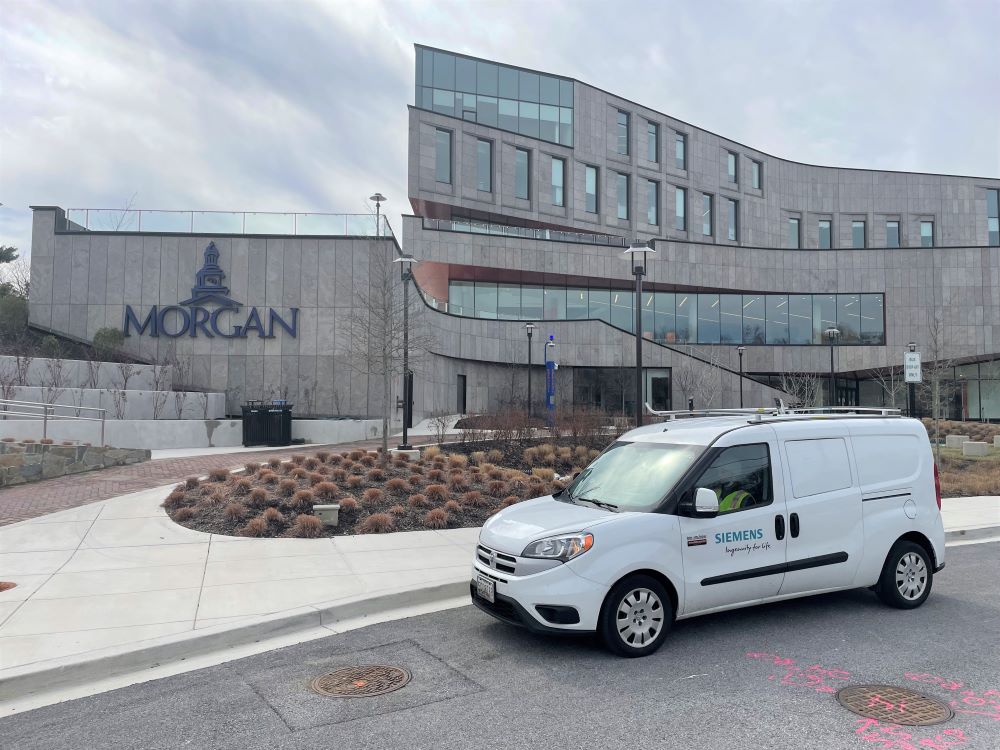As part of its 10-year strategic plan, “Transformation Morgan 2030: Leading the Future,” Baltimore-based Morgan State University (MSU) is well on the path to becoming a smart and connected campus of the future.
Improvements currently underway include implementing a series of modernization upgrades to the university’s HVAC, security, and fire and life safety systems with a focus on energy efficiency, resiliency and sustainability. All work is umbrellaed under a master service agreement between Maryland Clean Energy Center, Siemens and MSU to support the university’s campus transformation.
Like many other higher education institutions, MSU must contend with significant deferred maintenance and infrastructure needs. COVID-19 helped accelerate the need for repairs and upgrades as facilities and equipment remained dormant or underutilized due to a campus closure. With the aid of Federal COVID Relief funding, the university has been able to address some areas of concern, such as improving indoor air quality; however, there is more work to be done.
By way of its partnership with Siemens, MSU is taking proactive steps towards becoming a state-of-the-art “smart campus” focused on energy efficiency and production through systems integration and digitalization with substantial investments in clean and renewable solutions.
“In our strategic plan we set a deliberate goal of improving campus-wide infrastructure to support operational excellence and increase overall institutional capacity. One of the ways in which this can be accomplished is through strategic investment in our campus facilities,” says David Wilson, Ed.D., president of Morgan State University. “In order to grow into the leaders that they are destined to be, our students require a healthy, safe, secure, and resilient campus setting. Working in partnership with Siemens in developing a more sustainable learning/instructional environment for our community moves us in a positive direction.”
“The vision of this partnership in the areas of energy conservation, decarbonization and STEM education will serve as a model for a Smart Campus by underlining our common commitment to sustainability and society,” adds Paul Hayes, president, Regional Solutions & Services, Americas for Siemens Smart Infrastructure USA. “We are proud to have a contributing role in MSU’s long-term strategic plan for institutional success.”
As Dr. Wilson notes, sustainability is important – not just for the campus and buildings but also, for the students and faculty. With a focus on helping institutions achieve their sustainability targets, Siemens Financial Services (SFS) – the financing arm of Siemens – is providing capital for this project.
“Sustainability and decarbonization have been core initiatives for Siemens for many years,” says Head of SFS Commercial Finance Americas, Markus Edstrom. “We are happy to see institutions such as MSU taking the initiative to reduce their carbon footprint by focusing on their energy efficiency, which falls directly in line with SFS’ vision to help even more small and medium-sized enterprises transition to net-zero in the future.”
MSU remains top-ranked among Historically Black Colleges and Universities (HBCUs) for producing African-American graduates in electrical, civil, and industrial engineering. Recently, Siemens, through support of the Siemens Empower Program, collaborated with Morgan’s Clarence M. Mitchell, Jr. School of Engineering to organize Mechatronics: PLC Programming Training for students pursuing a degree in Mechatronics Engineering.
The training familiarizes students with the Siemens S7-based learning system—covering such areas as programmable logic controller (PLC) operation, PLC programming, event sequencing, timer/counter PLC instructions and I/O simulators. The training begins this summer.
Siemens Press Contact
Allison Britt
+1-630-399-2587
About Siemens
Siemens Smart Infrastructure (SI) is shaping the market for intelligent, adaptive infrastructure for today and the future. It addresses the pressing challenges of urbanization and climate change by connecting energy systems, buildings and industries. SI provides customers with a comprehensive end-to-end portfolio from a single source – with products, systems, solutions and services from the point of power generation all the way to consumption. With an increasingly digitalized ecosystem, it helps customers thrive and communities progress while contributing toward protecting the planet. With around 70,000 employees worldwide, Siemens Smart Infrastructure has its global headquarters in Zug, Switzerland, and its U.S. corporate headquarters in Peachtree Corners, Georgia, USA. For more information, click here.
Siemens Financial Services (SFS) – the financing arm of Siemens – provides business-to-business financial solutions. A unique combination of financial expertise, risk management and industry know-how enable SFS to create tailored innovative financial solutions. With these, SFS facilitates growth, creates value, enhances competitiveness and helps customers access new technologies. SFS supports investments with equipment and technology financing and leasing, corporate lending, equity investments and project and structured financing. Trade and receivable financing solutions complete the SFS portfolio. With an international network, SFS is well adapted to country-specific legal requirements and able to provide financial solutions globally. Within Siemens, SFS is an expert adviser for financial risks. Siemens Financial Services has its global headquarters in Munich, Germany, and has around 2,900 employees worldwide.
Siemens Corporation is a subsidiary of Siemens AG, a technology company focused on industry, infrastructure, transport, and healthcare. From more resource-efficient factories, resilient supply chains, and smarter buildings and grids, to cleaner and more comfortable transportation as well as advanced healthcare, the company creates technology with purpose adding real value for customers. By combining the real and the digital worlds, Siemens empowers its customers to transform their industries and markets, helping them to transform the everyday for billions of people. Siemens also owns a majority stake in the publicly listed company Siemens Healthineers, a globally leading medical technology provider shaping the future of healthcare. In addition, Siemens holds a minority stake in Siemens Energy, a global leader in the transmission and generation of electrical power. Siemens has been supporting the industries and creating the infrastructure forming the backbone of America’s economy for more than 160 years, with more than 40,000 employees, 17,000 suppliers, and customers in all 50 states and Puerto Rico. In fiscal 2021, Siemens Group USA generated revenue of nearly $20 billion.













